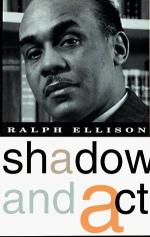
|
| Name: _________________________ | Period: ___________________ |
This test consists of 5 multiple choice questions, 5 short answer questions, and 10 short essay questions.
Multiple Choice Questions
1. Who is Mrs. L.C. McFarland?
(a) History teacher in Ellison's grade school.
(b) Author of "Bound for Glory Someday".
(c) Literary critic for the New York Post.
(d) Woman who would become Ellison's second wife.
2. What are Crane's parents like?
(a) Libertine alcoholics.
(b) Fundamentalist Christians.
(c) Marxist sympathizers.
(d) French born intellectuals.
3. Why does Oklahoma hold some freedom and equality for Negroes at the time Ellison lived there?
(a) It has no tradition of slavery.
(b) Oklahoma is founded on Mormon principles which forbade prejudice.
(c) It is fully integrated and equality was legislated.
(d) There are almost no Negroes in Oklahoma.
4. How does Ellison describe the writer Malraux?
(a) French counterpart.
(b) Polar opposite.
(c) Literary ancestor.
(d) Greatest nemesis.
5. What is the origin of the essay "Change the Joke and Slip the Yoke?"
(a) "Invisible Man."
(b) Letter written by Ellison when he was living in Rome to an old friend.
(c) Short story about lynching.
(d) Treatise on the folk art of tying knots.
Short Answer Questions
1. Who is Stanley Hyman's favorite archetypal figure?
2. Where might Crane have gotten information about the Civil War?
3. What is dangerous and different about Wright's attitude?
4. Other white cultures have black face type entertainment, but what is different about American black face?
5. What does Huckleberry Finn recognize about the Negro character, Jim?
Short Essay Questions
1. What is Ellison's basic quarrel with Hyman?
2. What does the phrase "The World and the Jug" refers to?
3. What is the difference between the way Hyman and Ellison view "the darky" entertainer?
4. What is different about Oklahoma and the relationship of different races when compared to the South or even to Texas?
5. Where do Ellison and Hyman divide in their understanding of black face minstrel performance?
6. What does the Negro say when white America holds up twentieth century fiction and say "this is the American reality?"
7. What does Ellison find so remarkable about Crane?
8. How did a library for Negro persons emerge in Oklahoma City?
9. Who was it that suggested to Ellison that he review a book and write a short story?
10. What writers are at issue in the exchange between Irving Howe and Ralph Ellison?
|
This section contains 1,065 words (approx. 4 pages at 300 words per page) |

|




